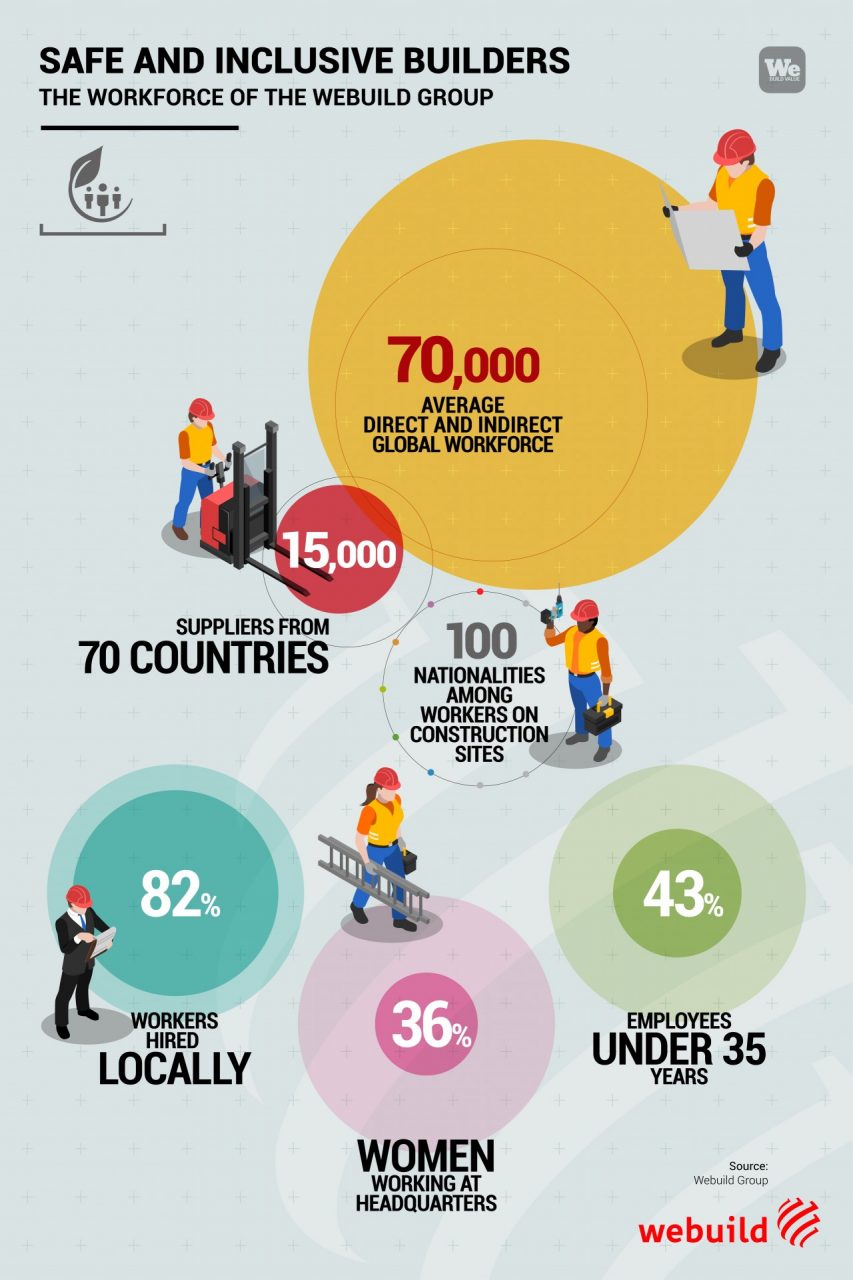A sustainable construction site is a safe construction site. Safety, in the context of large-scale works, is a fundamental pillar. To ensure safety, training and inclusion efforts are essential, but so is the ability to innovate. New production models, along with investments in new technologies, are the natural results of this approach.
These ingredients all combine in “Safe and Inclusive Builders,” a program launched by the Webuild Group to guarantee safety and inclusion in its large construction sites around the world. The program aims for a profound transformation in work management by prioritising inclusion and applying innovative technologies to ensure productivity and safety. When looking at the impact of changes in recent years, the numbers speak for themselves.
Training of the workforce
Training is essential for achieving the most challenging safety- and inclusion-related objectives. Training should be continuous, both within and beyond worksites, and used as a chance to increase skills as well as productivity across various phases of the work process.
To this end, the Group started the program Valyou (“Our Health and Safety Way”), aimed at the company workforce and at improving training and internal communication. Between 2018 and 2020, the program was adopted in more than 28 worksites, involving more than 2000 managers and supervisors through more than 150 workshops and 11,000 training hours.
On a parallel track, to increase awareness and a share culture, starting from 2016 the “World Safety Day” promoted by ILO (International Labor Organization) was celebrated in the Headquarter and in our construction sites with events and initiatives dedicated to safety with the involvement of our people in more than 160 construction sites over 6 years.
Construction site safety as a top priority
Technology and innovation are two key factors in determining safety – technology as a tool for risk monitoring at work, and innovation as added value within training and technical communication programs.
Technology and innovation are therefore essential in pursuing the goal of zero accidents. With this goal in mind, the Group is developing certain technologies such as sensors on vehicles, scaffolding and helmets that can detect area risks in real time and alert the workers involved.
Safety training continues, carrying out through innovative tools.
Inclusion, workers, and the supply chain
From Australia to the United States, from Saudi Arabia to Argentina, 70,000 people on average every year work for the Webuild Group, whether directly or indirectly. People of different origins, nationalities and cultures frequently find common ground in their applied methods and approach to everyday work.
Today, there are 100 different nationalities represented across Webuild construction sites, with 82% of the workforce hired locally. These numbers include a wealth of skills, but also speak to the need to bring diversity to a shared work model. This model should be extended to the multifaceted world of the supply chain. There are 15,000 supplier companies of the Group worldwide, from 70 different countries, and between 2015 and 2020, purchases from local suppliers increased from 75% to 91% of the total goods and services used within the construction sites.
All this has a considerable impact on local economies. Each direct employee of Webuild creates 8 additional jobs within the indirect sphere and along the supply chain; each euro (€1=$1.23) generated by Webuild generates €3.5 ($4.29) in terms of GDP produced; each euro of salaries paid by Webuild generates €3 ($3.60) of employment income, and for each euro of taxes paid by the Group, €8 (€9.80) go into the coffers of the public treasury.
All these numbers perfectly explain what kind of impact the worksites around the world have, stimulating employment and wealth. Work and wealth then become essential tools to help launch young talents.
Talents: an investment in the future
Training and inclusion are two separate initiatives with a shared objective: encouraging new talents to join the Group’s growth efforts.
The image of construction as an old-fashioned, polluting sector with negative community impact has changed. Today, building major works means investing in new technologies, being sustainable, and proposing innovative models to improve people’s quality of life. A sector of increasing attraction for young talents.
Currently 43% of Webuild’s direct employees are under 35 years old. This figure alone speaks to the Group’s recruitment efforts, to say little of its commitment to internal training of future leaders. Work toward this objective is carried out via various channels and programs focused on the inclusion of young people, as well as through partnerships with the research world and with universities.
To that end, Webuild has developed partnerships and collaborations with several Italian universities, including the Politecnico di Milano, the University of Genoa, UTS di Sydney and the University of Melbourne. Within these universities, training courses are developed, oriented toward the professional and occupational needs of Webuild, helping to grow and nurture the managers and leaders of the future.


